Invited Speakers
2026 11th International Conference on Intelligent Information Technology (ICIIT) aims to gather professors, researchers, scholars and industrial pioneers all over the world. ICIIT is the premier forum for the presentation and exchange of past experiences and new advances and research results in the field of theoretical and industrial experience. The conference welcomes contributions which promote the exchange of ideas and rational discourse between educators and researchers all over the world. We aim to building an idea-trading platform for the purpose of encouraging researcher participating in this event. ICIIT 2026 is welcome qualified persons to delivery a speech in the related fields. If you are interested, please send a brief CV with photo to the conference email box: iciit@cbees.net.

Prof. Mohd Nazri
National Defence University of Malaysia, Malaysia
Prof. Dr. Mohd Nazri became Lecturer at National Defence University of Malaysia. Prof. Dr. Mohd Nazri Ismail had a deep involvement in computer network research and was awarded the prestigious “Educator Award 2009 – R&D/Education category” by MARA (Malaysia Agency). He has supervised Ph.D. and Master Students and teaching at undergraduate and post graduate level. Assoc. Prof. Dr. Mohd Nazri Ismail has published more than 100 papers in national and international journals (indexed ISI, SCOPUS, IET) and IEEE conferences. He has attended many international conferences throughout the world and has chaired many technical sessions. He has appointed as Technical Program Committee and organized more than 60 national and international conferences. He has appointed as Editorial Board member more than 90 international journals and 40 international reviewer panels (journal/proceeding). Awards and laurels won by Assoc. Prof. Dr. Mohd Nazri Ismail run into volumes and he has received 28 awards in R&D/Education. Assoc. Prof. Dr. Mohd Nazri Ismail is an International Association of Engineers (IAENG), IEEE Cloud Computing Community, Society of Digital Information and Wireless Communications (SDIWC), International Association of Engineers and Scienti
Speech Title:“Analysis of 5G in Indoor and Outdoor Environment Via Wireless Simulation Tool”
Abstract: A comprehensive understanding of 5G New Radio (NR) technology's performance in various environments is essential for its successful knowledge on how the technologies work in real life. Using the NetSim network simulator by UPNM to mimic the real world, this researcher explores how different areas affect 5G NR performance both indoors and outdoors. The project simulates 5G NR scenarios using the seven-phase waterfall model. To measure the impact of these obstacles, key performance indicators (KPIs) like data throughput, signal strength, and path loss are examined. The expected result is a thorough performance analysis of 5G NR that considers the impact of different environments in both indoor and outdoor settings. The KPIs will be used to present this analysis, giving Malaysian network service providers (NSPs) insightful information. The successful demonstration of 5G NR performance in current networks while different areas are present is the desired outcome, which will boost user experience and network performance.

Assoc. Prof. Mian Zhou
Xi’an Jiaotong–Liverpool University, China
Dr. Mian Zhou is a Senior Associate Professor and Director of
Research at the School of Artificial Intelligence and Advanced
Computing, XJTLU Entrepreneur College (Taicang). He also serves
as Director of the XJTLU–Deepleaper Instant Knowledge Engine
Joint Laboratory. Dr. Zhou received his Ph.D. in Computer
Science from the University of Reading, United Kingdom. His
research lies at the intersection of artificial intelligence,
computer vision, and continual learning, with a particular focus
on multimodal intelligence, autonomous systems, and the
sustainable evolution of large-scale models. He has proposed a
series of innovative methods in continual learning, including
dynamic network architectures, adaptive knowledge transfer
mechanisms, and semantics-driven learning strategies. His work
has appeared in prestigious journals such as Pattern Recognition
and Information Processing & Management, and in top
international conferences including ICCV, AAAI, ICME, and WACV,
where he has also received recognition for excellence. Dr. Zhou
has led and contributed to multiple national and provincial
research projects, including grants from the National Natural
Science Foundation of China. His interdisciplinary research
promotes the integration of AI technologies in autonomous
driving, biomedical intelligence, and industrial applications.
He has supervised students who achieved distinction in the
CyberC International Big Data Competition and the SURF Research
Program. As Program Chair of the International Conference on Big
Data and Artificial Intelligence (BDAI), Dr. Zhou is committed
to advancing international collaboration and fostering the next
generation of AI researchers.

Assoc. Prof. Jiaxin Cai
Xiamen University of Technology, China
Jiaxin Cai is currently an associate professor in School of Mathematics and Statistics, Xiamen University of Technology, China. He received a PhD degree in Mathematics (Information and Computing Science) from Sun Yat-sen University in 2014, a Master's degree in Biomedical Engineering from Southern Medical University in 2011, and a Bachelor's degree in Biomedical Engineering from Southern Medical University in 2008. He has worked as a lecturer and then an associate professor at Xiamen University of Technology since 2014. His research interests include machine learning, pattern recognition, and medical informatics. He has published 46 papers as the first author or corresponding author in academic publications such as IEEE Trans, including 2 ESI highly cited papers.
Speech Title:Later Temporal Attention in Computer Aided Medical Diagnosis”

Dr. Thanh Tung Khuat
University of Technology Sydney, Australia
Dr. Thanh Tung Khuat is a Research Fellow at the Complex Adaptive Systems Lab and the ARC Digital Bioprocess Development Hub at the University of Technology Sydney, Australia, as well as the Co-founder and Chief Research Officer of NuverxAI Co., Ltd., Vietnam. With over a decade of experience in artificial intelligence (AI), machine learning (ML), and predictive modeling, he has made outstanding contributions to both research and industry applications, particularly in biotechnology, pharmaceutical manufacturing, logistics, finance and economics, smart agriculture, and business data analytics. As a leading expert in adaptive machine learning, explainable AI, and process optimization, Dr. Khuat has developed advanced ML models to enhance productivity and monitor biopharmaceutical manufacturing processes, optimize supply chains, and deliver highly accurate forecasts for complex financial and business intelligence systems. He has also made significant contributions to the advancement of Responsible and Explainable AI, promoting transparency and fairness in commercial AI systems. One of his key achievements is the development of Hyperbox-Brain, an open-source library for neuro-fuzzy machine learning designed for small-data learning, dynamic environments, and high interpretability. Hyperbox-Brain has been widely applied across fields such as biomedicine, smart manufacturing, and real-time time-series analytics, with tens of thousands of downloads from the global research and industrial community via GitHub, PyPI, and Conda. With a strong publication record of over 40 scientific papers in top-tier international journals and conferences, along with multiple prestigious awards for research and innovation, Dr. Khuat is not only an outstanding researcher but also a strategic advisor to enterprises and startups in their AI adoption and digital transformation journeys. He has led numerous academia–industry collaboration projects, successfully translating advanced AI solutions into practical manufacturing and business operations.
Speech Title:“Machine Learning in Biopharma 4.0”
Abstract: The biopharmaceutical industry is entering a transformative era, Biopharma 4.0, where machine learning (ML), advanced analytics, and automation converge to revolutionize how we design, monitor, and control bioprocesses. Yet, despite decades of data generation in cell culture, upstream, and downstream processes, much of this data remains underutilized. This talk explores how ML-driven intelligence is redefining the biopharma value chain, from cell line development to real-time process monitoring and control and digital twins. We will uncover how process analytical technology (PAT) data, especially from Raman spectroscopy, are being integrated into predictive ML models to enable self-optimizing bioprocesses and adaptive control strategies. Case studies from industry leaders will also illustrate how these technologies accelerate process understanding, enhance product consistency, and reduce time-to-market. Finally, we will discuss the emerging paradigm of explainable and automated ML in bioprocessing, emphasizing trust, transparency, and regulatory alignment with Quality by Design principles. As we move toward intelligent biomanufacturing ecosystems, this talk will outline the roadmap to unlock the full potential of Machine Learning in Biopharma 4.0, where data truly drives discovery, development, and delivery.
